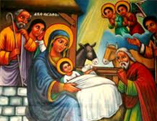|
ATTRACTION FESTIVALS & HOLIDAYS
 |
Ethiopia, an old country beyond all imaginations, has culture and traditions dating back over 3000 years. With over 80 different Ethnic groups with their own language, culture and traditions. The strong religious setting, celebrations and festivals play an important part in every ones daily life. Church ceremonies are a major feature of Ethiopian life.
The events are impressive and unique. The Ethiopian Orthodox Church has its own head, follows its own customs, and is extremely proud of its fourth century origins.
Ethiopia's Islamic tradition is also strong and offers colorful contrast, particularly in the eastern and south-eastern parts of the country. In fact, there were Ethiopian Muslims during the lifetime of Prophet Mohammed. This rich religious history is brought to life in the romantic walled city of Harar, considered by many Muslims to be the fourth "Holy City" following Mecca, Medina, and Jerusalem. |
|
ETHIOPIAN NEW YEAR (ENKUTATASH) |
 |
Ethiopia still retains the Julian calendar, in which the year is divided into 12 months of 30 days each and a 13th month of 5 days and 6 days in leap year. The Ethiopian calendar is 8 years behind the Gregorian calendar from January to September and 7 years behind between September 11 and January 8.
Enkutatash means the "gift of jewels". When the famous Queen of Sheba returned from her expensive jaunt to visit King Solomon in Jerusalem, her chiefs welcomed her bolts by replenishing her treasury with inku or jewels. The spring festival has been celebrated since this early time and as the rains come to their abrupt end, dancing and singing can be heard at every village in the countryside.
Enkutatash is not exclusively a religious holiday. Today's Enkutatash is also the season for exchanging formal New Year greetings and cards among the urban sophisticated - in lieu or the traditional bouquet of flowers. |
| |
ETHIOPIAN EPIPHANY ( TIMKET ) |
 |
Timket, feast of Epiphany is the greatest festival of the year falling on the 19th of January, two weeks after the Ethiopian Christmas. It is a three-day affair beginning on the eve of Timket with dramatic and colourful processions. The following morning the great day itself, Christ's baptism in the Jordan River by John the Baptist is commemorated. The sun blazes down from a clear blue sky and the festival always take place in glorious weather. |
| |
ETHIOPIAN CHRISTMAS (GENA) |
 |
Christmas, called Lidet, is not the primary religious and secular festival that it has become in Western countries. Falling on 7 January, it is celebrated seriously by a church service that goes on throughout the night, with people moving from one church to another. Traditionally, young men played a game similar to hockey, called Genna, on this day, and now Christmas has also come to be known by that name. |
| |
FINDING OF THE TRUE CROSS (MESKAL) |
 |
Meskal has been celebrated in the country for over 1600 years. The word actually means "cross" and the feast commemorates the discovery of the cross upon which Jesus was crucified, by the Empress Helena, the mother of Constantine the Great. The original event took place on 19 March 326 AD. But the feast is now celebrated on 27 September.
Many of the rites observed throughout the festival are said to be directly connected to the legend of Empress Helena. On the eve of Meskal, tall branches are tied together and yellow daisies, popularly called Meskal Flowers, are placed at the top. During the night those branches are gathered together in front of the compound gates and ignited - This symbolizes the actions of the Empress who, when no one would show the Holy Sepulcher, lit incense and prayed for help. Where the smoke drifted, she dug and found three roses. To one of the three, on the True Cross of Jesus, many miracles were attributed.
Meskal also signifies the physical presence of part of the True Cross at the church of Egziabher Ab, the remote mountain monastery of Gishen Mariam located 483 kms north of Addis Ababa. In this monastery, there is a massive volume called the Tefut written during the reign of Zera Yacob (1434 - 1468), which records the story of how a fragment of the cross was acquired.
At this time of the year flowers gloom on mountain and plain and the meadows are yellow with the brilliant Meskal daisy. Dancing, feasting, merrymaking, bonfires and even gun salutes mark the occasion. The festival begins by planting a green tree on Meskal eve in town squares and village market places. Everyone brings a pole topped with Meskal daisies to form the towering pyramid that will be a beacon of flame. Torches of tree branches tied up together called "Chibo" are used to light the bundle called "Demera" |
|